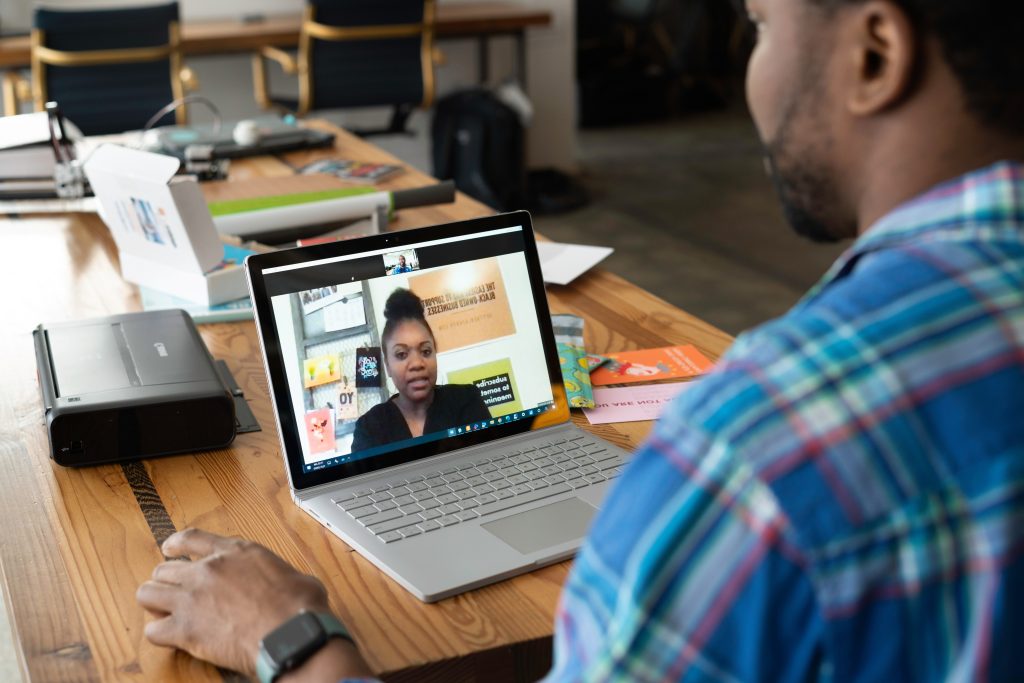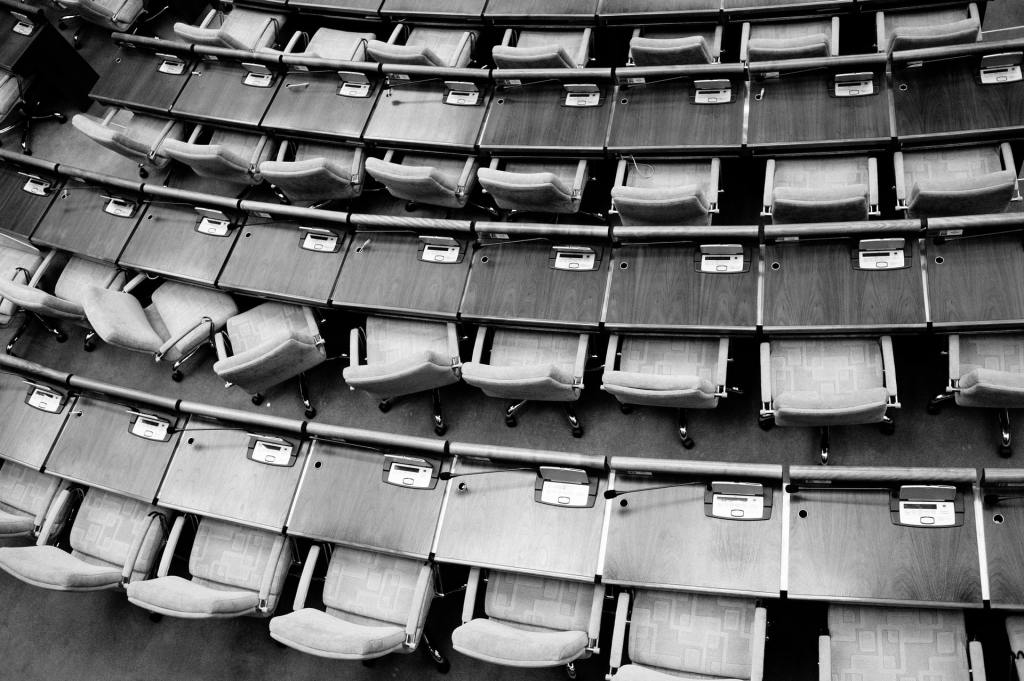Negative Tv Coverage News Minorities Peer Reviewed Articles
A spate of police force and vigilante slayings of unarmed African Americans has renewed handwringing over the nation's comparative lack of Blackness journalists, the headlines they comprehend and workplace bias they all the same sometimes confront. How the industry confronts that decades-erstwhile conundrum, this fourth dimension around, remains to exist seen.
"The thing that frustrates me more than anything is that many of these [news] managers come out with these statements that say 'We support black lives' … that they support multifariousness, they support inclusion. Withal, when we ask them to publicize their numbers on diversity, they're silent," National Clan of Black Journalists President Dorothy Tucker said, during a contempo episode of Knight's Informed & Engaged series.
An investigative reporter for Chicago's CBS chapter, she was i of four Black journalists assembled for that online discussion, also exploring recent Gallup/Knight and Pew research showing Blackness and white news consumers' often divergent views of the news media and the kind of workforce multifariousness that the industry should pursue.
In the aftermath of George Floyd's expiry at the hands of a Minneapolis constabulary officer, Tucker added, there'due south been a merited "insurgence" of sorts amongst Black journalists who've long fought, in many cases, for equitable pay and for a take chances at the industry'south more than coveted, high-contour assignments.
Referring to the news media's latest internal reckoning over race, speaker Jawan Strader, an ballast-reporter at Miami's NBC chapter, said, "Nosotros have their ear, more than so, than we had before, since George Floyd. We should have had their ears years ago … "
A racial divide over news coverage
The episode of Informed and Engaged kicked off with a rundown of several key findings of landmark research by both the Pew Research Center and the Gallup/Knight series on Trust, Media and Democracy. Among the highlights:
- Americans agree that newsrooms need to be various, only Blacks would like to see more racial diversity, while whites prefer more political diversity (Gallup/Knight)
- Blacks are underrepresented equally newsroom employees in the U.S. (Pew)
- Most Americans say news organizations don't empathize them, but Black adults more often say it's considering of their social or economic class, or personal characteristics, while whites says it'due south because of their political views. (Pew)
Who's in the newsroom matters
Black journalists with decision-making power or their boss'due south confidence can brand a big difference in news coverage. For example, New York-based ProPublica investigative reporter Topher Sanders, another speaker, said the ProPublica/Florida Times-Marriage Walking While Blackness series, a seven-month reporting project, began as a smaller endeavour. The series establish that Blacks fabricated up 29 percent Jacksonville, Florida's population but received 55 percentage of its pedestrian citations.
"When I brought the concept to the editor, the editor said, 'Hey, take a few weeks on this, let's turn in something quick. There's this other big thing I want you to do," said Sanders, co-founder of the Ida B. Wells Social club for Investigative Reporting, who worked on the series with reporter Ben Conarck. "To that editor's credit, as nosotros presented more and more material, the editor began to run across the vision me and Ben saw in the very kickoff, "
Diversifying investigative teams is important, the speakers said.
"When those are your gilt-standard reporting teams within an organization and they lack diversity, what types of projects volition exist pursued?" added Sanders, whose nonprofit club is building what now is a comparatively small supply of investigative journalists of color. "It's a no-brainer that, when you have diverse thoughts and perspectives, information technology shows up in the work. And information technology starts to show up in the community. Lots of times, the work generated from investigative reporting has real impact."
Black journalists' objectivity continues to be questioned
"Are Black journalists biased? Because at that place'south that supposition," said moderator Karen Rundlet, a Knight Foundation journalism program director and former journalist.
"No," answered an emphatic Tucker. "It really upsets me when everyone even raises that question — because you don't ask white journalists are they biased … We're professional, we do our jobs, we can embrace any story, we tin can expect at every angle …
"Simply we accept to bring our experiences to the story. And that's what makes us have the advantage in a newsroom. Because we are Black, because we empathise what that person in the neighborhood may exist going through, because nosotros speak the linguistic communication, because nosotros share a culture, then, nosotros can bring all of that to the story that, perhaps, someone who is non Blackness cannot bring."
Challenging newsroom civilisation is key
News coverage and who shapes it is merely one aspect of the present challenges to diversity, said Karen Hawkins, The Chicago Reader'due south co-editor in chief.
"The other part of that equation is newsroom civilization," she said. " … and the culture of newsrooms that supports this status quo idea that you accept to exist straight and white and middle grade in club to be objective, that that is the default position for viewing the world. And if you're not those things, then you are biased."
Sanders interjected. "The positioning of bias versus objectivity is faux in and of itself, the ii are not polar opposites… I take a view bespeak, I have a perspective. It doesn't brand its way into my news coverage, merely it does guide my interest."
"Walking While Blackness," he said, resulted from seeing the story through his particular lens, he said. He'd watched the viral video of Jacksonville police officers illegally stop a young Blackness human being, ask for his I.D and attempt to ticket him for not having it.
"I was offended that the officeholder tried to, basically, say, 'Hey, can I see yous're walking papers' … That's where I commencement to put on my skills hat. I know how to obtain the information to evidence that they've washed that earlier … Equally a journalist I tin ask educated questions that tin lead to a story that has profound touch on on that issue."
"It'southward ok to add perspective as a journalist," Strader said. "Aye, I'thousand a journalist. At the aforementioned time, I'chiliad a black man."
Incomplete information on newsrooms' racial make-up continues
In 2018, just 17% of the nation's then 1,700 members of the American Order of News Editors answered its annual diversity survey. Information technology was a historic low for that survey, launched in 1998. In 2019, 22% of newsrooms responded to the survey, now conducted by the News Leaders Association, the umbrella organization for ASNE and Associated Press Media Editors. The association hasn't released its 2020 report.
But the latest Radio Television News Directors Association variety survey, released in September 2020, received what researchers said were valid responses from 1,313, or 77%, of 1,702 non-satellite Tv set stations and from a random sample of more than 3,400 radio stations.
That at that place is no total accounting of news media diverseness beingness done by industry leaders is problematic, Tucker said.
Yet, amid current protests over police force brutality and a range of race-driven social inequities, including in journalism, she has been fielding several calls a week with news executives request her organisation'due south advice.
"Just it's very hard for us to mensurate success when nosotros don't have the data," Tucker said. "The business is possibly they don't look that good."
Recent Content
Source: https://knightfoundation.org/articles/the-racial-divide-on-news-coverage-and-why-representation-matters/



0 Response to "Negative Tv Coverage News Minorities Peer Reviewed Articles"
Post a Comment